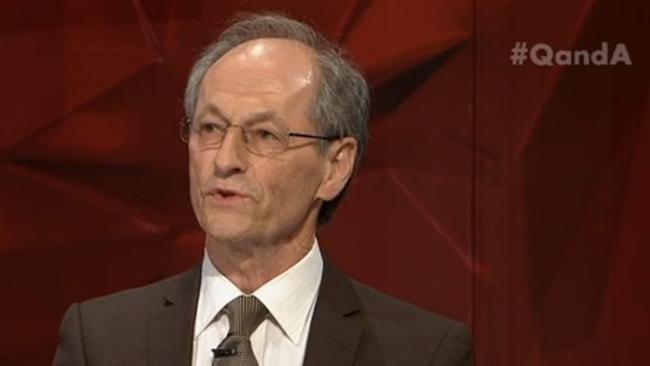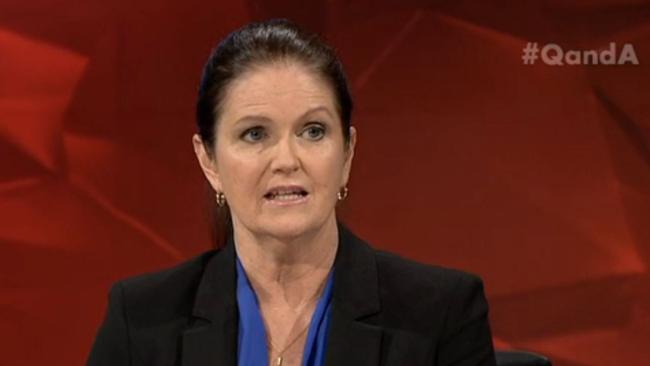A question on unemployment benefits stumped Q&A panellist
AN ECONOMICS professor drew a blank on Q&A when she was asked how people were supposed to survive on meagre unemployment benefits.
A Q&A panellist was stumped when she was asked a critical question about how people were expected to survive on unemployment benefits.
University of Sydney’s economics Professor Deborah Cobb-Clark was asked by an audience member how a couple with kids is supposed to survive on welfare, on $1200 a fortnight, while forking out 80 per cent of their income on rent.
Those on youth allowance are paid even less.
“I actually don’t know the answer to that question,” she said.
But Professor Cobb-Clark came up with an answer and said while welfare payments did not vary much geographically, people in regional areas benefited a lot more because it was a cheaper area to live.
But it was a catch-22 as there are not as many employment opportunities in regional areas as there are in the city.
@QandA for most city dwellers welfare Doesnt cover the cost of living. I tried somewhat briefly.
— Louise Avery (@Melbbasho) August 29, 2016
Other panellists included Indigenous Advisory Council chair Warren Mundine, World Medical Association president Sir Michael Marmot, Christine Bennett from the University of Notre Dame School of Medicine and Australian Council of Social Service head Cassandra Goldie.
Sir Michael said if the government made unemployment benefits too generous, people wouldn’t go back to work.
“It makes sense, but it is wrong,” he said.
“When we look across Europe, the countries with the more generous unemployment benefits have the lowest unemployment levels.”
@QandA @MichaelMarmot @cassandragoldie There never has been and nor will there be enough jobs for all
— Frances (@graceomalley122) August 29, 2016
Sir Michael said work was much better than welfare, but societies with generous unemployment benefits and unemployment schemes helped people who couldn’t work to be able to survive and afford rent and food.
“But it is more likely to get them back into work as well,” he said.

Ms Goldie said single parents using payday lending would spend 80 per cent of it just covering the basics, like food and electricity.
“That’s where we’re at. The unemployment payment — because of politics, because of, you know, this free-handed sort of stigmatising, shaming you if you can’t get a job — hasn’t been increased in over two decades,” she said.
“It is the lowest comparatively in the Organisation for Economic Co-operation and Development. That’s where we’re at. Last year the business communities, all the business peak bodies, the unions and the community sector, came together and said on social, moral and economic grounds, that payment must be increased. It is a barrier to helping people to do their bit to get employment. It is a social and economic investment — not a cost.”
The question sparked debate and Mr Mundine said he believed people were surviving on the welfare they received.
“We did a survey on welfare housing within Aboriginal communities and we found out that some of those houses were making more money than people who were actually working,” he said.
“What it was, they were able to get groups of people living on welfare, living in houses together, pooling all those funds.
“I came from a poor background myself. When we lived in Sydney we couldn’t pay the electricity bills. But as a group of people we got together and were able to share our money around.”
@QandA @nyunggai @cassandragoldie so the solution is, all move in together and we'll be right?
— Michael Heuston (@heusto77) August 29, 2016
Unemployment was the main topic of discussion on Monday night’s Q&A and whether it was the responsibility of the unemployed to get back into work.
Mr Mundine questioned how we could create enough jobs for the large population that was unemployed.
“How do we create that environment for opportunities? How do we start to create the environment for investment?” He said.
“I see jobs as an end result of economic stimulus, of commercial activity. business activity and other things happening, government activity. That’s what creates the job. In the indigenous communities, we always had the cart before the horse. We always spoke about employment but we never spoke about what creates employment.”
Mr Mundine said this had a flow-on effect to the children, who didn’t have enough understanding about the need to work.
Mr Mundine was walking down the streets of Dubbo in Central West NSW when he learnt a valuable lesson from a 10-year-old indigenous boy.
He wasn’t at school and when Mr Mundine asked him why, he said teachers were racist.
Mr Mundine told him it was the adult’s job to worry about that, and he just had to focus on his education.
“He said, ‘why should I?’ and I said, ‘you get educated and you get a job and stuff’,” Mr Mundine said.
The boy panned his hand across a line of shops and said “show me a black face in those shops”.
“There were none,” Mr Mundine said.
“If we create jobs through stimulus, the kid sees his parents going to work. So he gets the idea of why he needs to get educated.
“While their parents are not working, of course you will have the odd one here or there who will take up the challenge, but the vast majority will say, ‘why should we go to school?’ Because there is no job.”
Mr Mundine said if people got into jobs, it would make a difference in their communities.

Ms Goldie hit back and said the number of people on welfare for their lifetime was very small, only about five per cent.
But Mr Mundine reminded her in Aboriginal communities it was a whopping 51 per cent.
Mr Goldie was making the point however, looking at the overall population, people were not bludging.
“To get your social security is not passive. You have to apply for a job a day, 10 jobs a fortnight, you have to turn up to an employment service provider. You have all this compliance, all this activity, which means if you don’t do it you won’t be able to feed yourself,” she said.



